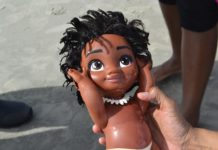A number of years ago I read an article that interviewed adults who had been interculturally and interracially adopted in the 1970s. Though all of the people interviewed appeared to be happy with their adoptive families, they all expressed a sense of loss. They all also talked about the ways in which they had tried to make sense of their identity as adults.
There are a lot of European families who are in the process of adopting Kenyan children in my neighbourhood in Nairobi. The adoption process in Kenya is rightfully long and the parents usually have to spend a number of months in the country with the children. Their children are often instantly recognizable (until the parents get up to speed) by skins that are regularly not well moisturized and their hair not always well groomed.
It takes time for a mother or father from say the Netherlands to understand the intricacies of looking after African skin and hair. I often find myself thinking that even if they buy the products here, where are they going to find the right oils if they are returning to a rural part of Europe? Having gone to school in rural Britain, I know what it can be like.
One of the key complaints of many of the parents adopting is the complications of the Kenyan system. Unlike neighbouring Ethiopia, Kenya is lengthy and bureaucratic. Whereas I agree that there can be a lot of unnecessary form-filling in Kenya, I do not think that three weeks is long enough for parents and child to get to know each other before the child is taken out of their biological context to somewhere entirely different. This is especially important given that no major systems are in place for international adoptions that go wrong. This was clearly highlighted by the recent case in the U.S. where an overwhelmed mother sent her son back to his native Russia, but also in Kenya where a young child died of neglect at the hands of her foreign parents.
Yet I also see wonderful, diverse families that live happily together and children who have otherwise been abandoned being raised in loving homes. I am not sure that I have a big enough heart to adopt (be it for my own or the child’s sake) and I have a great amount of admiration for those that do. However, I wonder about the future of all these children that are growing up somewhere else, where a part of them will always be ‘the other’. I wonder whether the families that take them in have truly examined the complexities of bringing them up as rounded individuals, with both their psychological and physical well-being in mind. I feel that understanding this sense of loss must be a starting point for all of the communities involved with these children. Those that take them in, but also those that let them go.



































J. Clair,
I appreciate your honesty in what you are seeing around you in your neighborhood. My family will be coming to Kenya in a few months to adopt siblings. I have friends that are giving me tips on hair care and skin care and I will be taking a class (for adoptive parents) on how to care for African skin and hair 🙂 I think it should be required for all.
We will be a conspicuous family …. and we will do our best to keep our children connected to Kenya.
Hopefully, we will be a family that is a good example …. kids hair and skin cared for …. and most of all LOVED 🙂
I am so interested to read differing thoughts on this topic! Even though you weren’t adopted, you grew up elsewhere than your birth country. Have you always felt like you were in the wrong place? Or did having a biological parent with you make that difference for you? Home is with family? Do you feel that your upbringing being a part of so many cultures that weren’t “your own” was a detriment to you or enriching?
@soon2b2mumof4 – wishing you and your new family all the best
@anjanette – yes, for a long time i wondered about where/who i should be given the way i grew up until finally i realised i only had a problem when i was trying to use other’s yardsticks who insisted that i must fit into a particular category. it certainly helped having grounded biological parents (that is not to say adoptive parents cannot be grounded). i would not change a thing about my life – it has enriched me in more ways than i could possibly list. what i discovered in the end is that home is where the connection is – whatever shape that may take.
Seriously, hair and skin? Is that a major issue compared to not having enough food,d proper education or loving parents, which is the alternative for children who have been either abandoned or whose parents have died leaving them alone or in an orphanage.
Europe is diverse these days, there are plenty of hair salons to help with any kind of hair and there is such a thing as the internet which has plenty of info on how to care for all kinds of skin and hair and there is Amazon who ship beauty products, skin care lotions and hair care products everywhere.
If you have objections to interracial adoption, please base them on serious issues and on the realities.
Sadly children are mistreated daily around the world, in all countries. In fact adopted children are less mistreated and fare better than biological children, statistically looking. Adoptive parents are checked and checked again, whereas any looser can father or mother a biological child. Yes, the examples you gave are awful, but have nothing to do with ‘adoptive’ parents, only with idiot parents, amoral morons who should be jailed and held accountable.
You write “However, I wonder about the future of all these children that are growing up somewhere else, where a part of them will always be ‘the other’.” Well what about growing up in an orphanage when everyone else has parents, relatives and a home? How on earth is that not growing up ‘ the other’? How is growing up without parents, without daily love and affirmation from a family, without economic stability, without education, without proper food and the possibility of a full and rich life, not immediately and obviously worse than having a different skin color than your parents and yes, being ‘the other’?
Seriously this article is without any depth or knowledge and is truly awful in its simplistic approach to something as important as how the world, together. takes care of our children?